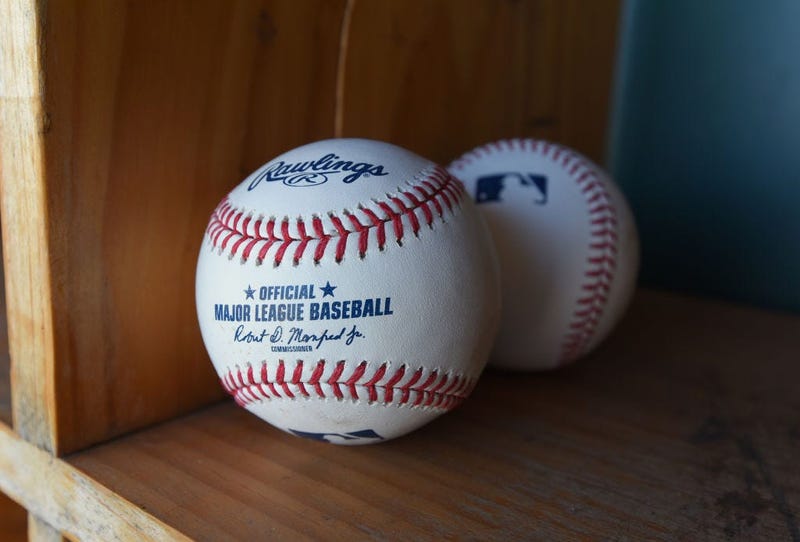
Much as we'd like to pimp someone else's work product (in other words, not at all), Sunday's ESPN-ification of the Mark McGwire/Sammy Sosa home run chase of 1998 may end up being a precursor to baseball's future. You have to be properly cynical to see it, which means I'm just the girl for the job, but it's certainly plausible.
First, it takes a sport in public freefall, which is absolutely baseball in 2020. The business' inability to put the game ahead of the money even one time is flirting with a national response of "sorry, but we can't be bothered" for the first time since the Depression.
Second, it takes the luck of stumbling onto a gimmick that the public will embrace, as baseball did in 1998 when it embraced homer porn as a marketing campaign. They didn't make McGwire or Sosa happen, but they didn't ask any questions either while they were reacting at light speed to the commercial possibilities.
And third, it takes a total willingness to ignore whatever must be done to fuel the gimmick, which Major League Baseball and its 30 owners did in 1998 by taking the PED money and eagerly asking for more. In fact, they did it for at least a decade before 1998, and didn't stop until the federal government started nosing around their business.
Fast forward to now and the conditions that prevail. We definitely have the first, between COVID-19, political and social upheaval and historical levels unemployment. Add an industry too interested in litigating a future collective bargaining agreement instead of trying to tackle the difficulties of performing athletic endeavors during a pandemic, and you've got all the freefall you can eat.
The second is harder to find, because our great national home run fetish has been replaced by a new, static and less action-based game in which homers are one leg of a stool with walks and strikeouts. And, truth be told, once you've seen 1998 and added 1,600 homers, you've seen it all. So baseball will have to stumble upon something different, new and un-homer-like to reinvent itself, or rededicate itself to perfecting syringe-based entertainment.
I'm not sure what that is, but baseball didn't know either when it ended the lockout in 1995. Ideas follow, which leads us to the third condition.
# Maybe it's speed baseball against a clock, which is antithetical.
# Maybe its the universal DH in all nine batting order places, which is antithetical.
# Maybe it's getting rid of replay and bringing back Earl Weaver-level arguments, which isn't antithetical but it will piss off technology freaks.
# Maybe it's forbidding the manager from using analytics at all and relearning how to play educated hunches, which also isn't antithetical and will piss off every general manager in the game.
# Maybe it's in creating a new market in the inner cities, where baseball went to reinvigorate itself after World War II, which isn't antithetical and is even progressive given the new day before us all.
# Maybe it's just eliminating the unwritten rulebook and inciting more brawls.They could make Dana White the next commissioner. I mean, if you're going broad, go all the way broad.
And then after the scheme is seized or stumbled upon, someone has to figure a way to monetize that, and fortunately that is the only thing we know MLB s actually good at doing.
This third condition is always there. MLB is like every other endeavor in that it will dig up a city block to pluck a dime out the asphalt. If, for example, the sport could finally relocate the athletic pieces of its game and broaden its skill set beyond 100-mph fastballs, slow walks to the dugout, slow walks to first base or slow circular trots, let a thousand forms of pandering bloom. If it can recreate a level of cool it has lacked for at least a decade and slap a price tag on it, then every day is winner winner chicken dinner.
Oh, and if that means breaking the odd law or medical ethic or looking the other way while it was all happening, well, that money from two decades ago, when attendance rose 11,000,000 in three years and ratings spiked across the board, spent really well. Besides, nobody got arrested or anything, and no disgruntled patron ever got a refund. Ahh, the good old days.
So with management's latest proposal about to roll down the mahogany table, let's remember that history does have a way of repeating itself while adapting to conditions, and conditions have never been weirder or more worrisome. So if baseball can figure out a marketing hook and isn't particular about dodginess, Mark McGwire and Sammy Sosa can repeat themselves in another form.
But first they have to figure out whether they want to actually do games, and then figure out if they can. The problem of revivifying baseball becomes at least incrementally more difficult without, well, baseball.
